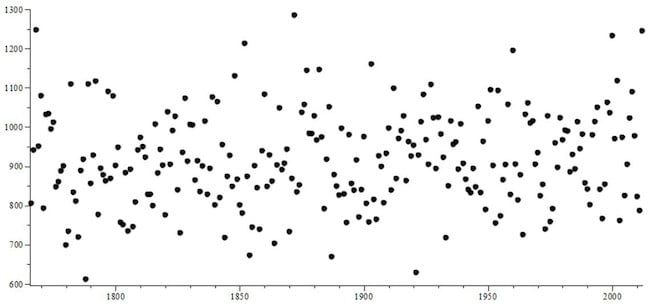The BBC broadcast a programme about a new railway line that threads its way through Jerusalem. The BBC thinks this line is somehow so controversial that it may be the catalyst for a new war, a new intifada…..started of course by the Palestinians…but we’ll gloss over that….‘ ….it has only deepened the sense of resentment on both sides. Travelling through the old city, he comes face to face with the battle over one of the world’s holiest sites and asks, could it be the flashpoint for the start of another war?’
The tale of the train, by Adam Wishart, a ‘British Jew’, as he liked to keep reminding us as if to suggest that as a Jew any criticisms of Israel are therefore valid and all the more powerful, was in reality just an excuse to parade a long list of ‘issues’ that are clearly of concern to Wishart and the Palestinians. It was a bit like decorating a Christmas tree with Muslim artifacts…at first glance maybe a genuine attempt at conciliation but is in fact a calculated insult.
This wasn’t really about the rail line and turned out to be a pretty one sided diatribe that forgot to mention Hamas or Fatah or any other Islamist organisation bombarding Israel with missiles….and the important fact that they all wish to wipe out Israel and create a Palestinian state ‘from the river to the sea’.
Which is a bit of an omission when he seemed so concerned about Israeli activists who wanted to increase the Jewish presence in Jerusalem…one was from the ‘Temple Movement’ which wants to rebuild the Temple on the Mount, the other a property developer who bought up land from Palestinians and built homes that were bought by Israelis…hoping to make Jerusalem de facto Jewish….note that he was buying land not bulldozing the occupants off it as the programme seemed to like to imply.
Apparently land was compulsorily purchased to build the rail line on…not as if that doesn’t happen here…reference HS2.…‘The department has written to all owners of properties that are very close to the proposed line of the route to inform them of the government’s decision, and the potential need to compulsorily purchase their property.’
Wishart tells us of a Palestinian who was offered compensation but refused the money for political reasons….Wishart tells us that the buying of the land ‘fits into a broader picture’ of land ‘seizure’….he also claims that the security barrier is in reality meant to cordon off the squalor and deprivation.
Note that frequently you can hear the Palestinians talking of the Yahood, the Jews, but the film doesn’t translate the words when they would be controversial, opting for a different, less obviously loaded and racist, term.
Wishart also concentrates on the Shuafat refugee camp. He puts all the blame for problems there onto the Jewish Mayor of Jerusalem. What Wishart doesn’t tell us is that it is UNRWA that runs the camp, created by the UN and Jordan when it was in control of the West Bank in 1965, and that Israel offered to hand the Shuafat area which includes the camp over to the Palestinian Authority but Palestinians themselves refused this ‘opportunity’…. ‘Nabil Abu Issa, head of the village of Muchtar, located a few hundred meters above the refugee camp, told the Post that he doesn’t see himself as a Palestinian. “We don’t want to be under Palestinian authority. We are Jerusalemites, we vote for the mayor and for the Knesset. We are part of this place and unless there are no two countries for the two people, we will stay here. It would be a mistake to hand over these villages; it would cause a mess and a bloodshed. What [would] happen if Israel gives us to the PA? How can a family prevent the rocket launchers from taking over their house and firing at Jerusalem? If I would have to, I’ll take my family and move to east Jerusalem, Jaffa or Haifa,” Abu Issa said. ‘
Ironically many of the problems are caused because Palestinians themselves actually want to move into Shuarat camp where the Israeli police and city authorities fear to tread and enforce the laws…they overload the limited infrastructure. As residents of an area of Jerusalem the Palestinians get the valuable ‘blue ID card’ which gives them the same rights as Israelis and allows them to travel freely. Shuarat is not what the BBC likes to label one of those ‘open prisons’.
Wishart doesn’t like the security barrier. He refers to it as the ‘barrier’…not a neutral term as it implies an attempt to create some sort of apartheid however there is a reason for that security barrier…..East Jerusalem’s Shuafat refugee camp a terrorist stronghold, security sources say.
Why did Wishart make this programme? After all it’s an old story, one told by the Guardian last year….but that told a more nuanced tale than Wishart…Jerusalem’s light railway: commuting with a rifle through the conflicted city.
For instance the BBC’s narrative was that Palestinians don’t use this train and that it is mostly used by Israelis moving into Palestinian areas…..the Guardian’s narrative is less one-sided….
Men dressed in ultra-orthodox monochrome, under hats and coats even in the Middle Eastern summer, squeeze on board, averting their eyes from young women tourists in shorts and skimpy t-shirts. Religious Jewish mothers, hair bound in long winding scarves, with a brood of small children clutching at their ankle-length skirts, stand alongside Palestinian women in skinny jeans and elaborate hijabs framing carefully made-up faces and groomed eyebrows.
Israeli soldiers in uniform, some armed with guns and all apparently armed with smart phones, lounge on seats opposite Palestinian labourers heading for jobs in Jewish areas of the city. Christian pilgrims en route to Via Dolorosa and the Church of the Holy Sepulchre, the site of Jesus’s crucifixion, mingle with Muslims heading to the sacred Dome of the Rock and al-Aqsa mosque, and Jews intent on praying at the revered Western Wall, the last surviving remnant of the Second Temple.
As for Israelis invading Palestinian areas and Palestinians being cut off by the railway…
The unintended consequence has been to make it much easier for Palestinians to get to the Old City. “It’s brought Haram al-Sharif [the site of the Dome of the Rock] closer to Beit Hanina and Shuafat,” says Seidemann.
And not just the Muslim holy sites, he adds; Palestinians are more visible in the west of the city than previously. “Has that united the city? No, but it’s an interesting change in the patterns of movement.”
The reverse is not the case. “The light rail has not brought Israelis into Palestinian areas of East Jerusalem. On the Israeli side, the patterns of movement have not changed at all.”
The main problem with the railway seems to be that it doesn’t run on the Sabbath…
That statement sits uncomfortably with the fact that Palestinians, who make up 37% of the city’s population, are deprived of this effective transport system on Saturdays, a normal working day for most of them, because the light rail does not operate on the Jewish sabbath.
Wishart finishes off his diatribe with clear evidence of what he intended with this film…
‘My journey has been heartbreaking. When my grandparents campaigned for the State of Israel they hoped for a place of refuge, tolerance and equal rights for all.
I just can’t believe this could be the place they dreamt of all those years ago.’
Maybe Wishart can explain the difference between his grandparents wishing to create the State of Israel by Jews in essence invading Palestine licensed by the UN and evicting the Palestinian residents and that of the settlers in the West Bank today. Not a great deal of difference. If his grandparents would have such qualms now why not in 1947? He can’t paint his grandparents as ethical and humane people who campaign for equal rights and tolerance when they conquered and took over what was Palestinian land. Maybe that’s what this film is all about…a great big guilty mea culpa.
On the same basis of land seized and a people unfairly treated where is his film about the creation of Pakistan and the even more horrendous events that unfold there?
I await it with interest.




 Talat-Farooq Awan
Talat-Farooq Awan